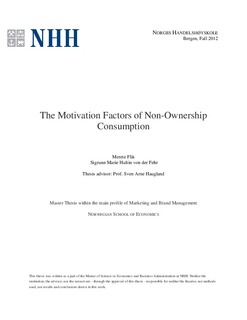| dc.description.abstract | There has been a rising trend that consumers choose to engage in consumption based on renting,
swapping, sharing, bartering and gifting with the use of new technology and product-service
systems, in the USA. We wanted to explore whether the same factors motivating such
consumption is true for Norwegian consumers, and whether there is a potential for such services
in the Norwegian market. The purpose of this master thesis is to investigate which factors
motivate non-ownership consumption. We have studied Norwegian consumers of car sharing,
music streaming and rental service of various goods where the users make transactions with each
other.
Our thesis is based on a literature study of previous research on non-ownership and productservice
systems, and a qualitative study of Norwegian consumers. The qualitative study is a case
study of users of three Norwegian product-service systems; Bildeleringen, Spotify and Sindro.
The background for our model and research is mainly the articles and studies of Lawson (2011),
Moeller and Wittkowski (2010), Durgee and O’Connor (1995) and Scholl (2008). We study
seven motivation factors, put together by factors from the different theories mentioned above;
simplicity orientation, perceived economic gain, variation and experience seeking, image
orientation, environmentalism, trend orientation and exploration and trial. We also study
impediments to non-ownership that might impair the motivation factors; the functional
perspective (i.e. transaction costs, information economics, principal-agent issues and property
rights) and the symbolic perspective (i.e. symbolic meaning of objects).
Our results show that the consumers from our study are not motivated to engage in nonownership
consumption by all the factors we started with. The revised model includes freedom
from ownership, convenience orientation, perceived economic gain, environmentalism and
testing. In addition, information economics (quality predictability) and transaction costs might
serve as impediments to non-ownership consumption even though the motivation factors
mentioned are present. | no_NO |
